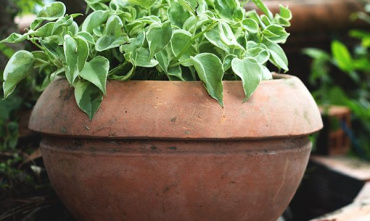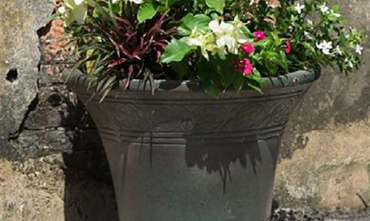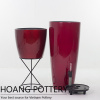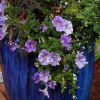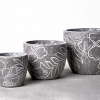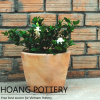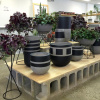First, you’ll have to choose a color palette, shapes and textures of your intended design.
COLORS
Each container will need a theme or color to allow each individual planter to stand out by itself, while still belonging to one overarching design. Therefore your finished container should look like a completely natural design, as if it’s one giant plant with elements that complement each other.
TEXTURE AND SHAPE
You should consider the foliage, shape of leaves and flowers, and the general growing habit of each plant. A wide variety of textures, shapes, and colors will all contribute to a successful spring planter.
Second, the right plant and location of your spring planter pot is really important. Consider the following:
EXPOSURE
How much sunlight does your planter receive? You’ll have different options if your planter is fully exposed to the sun all day long, or tucked into a corner that’s shaded from most of the sun’s rays.
WATER
Do you want to water the planter yourself, or your planter receive lots of rainwater? A plant’s drought tolerance is an important factor in designing a spring planter pot.
SPACE
How large is the container you are planting in? When you want your purchased planters to get growing, just keep in mind what you have room for and what the growing conditions are there.
Third, how many plants that you will need?
This relies entirely on the style of planter you like, your budget, etc. The total quantity of plants that you need is entirely up to you and your tastes.
Fourth, choose thriller, filler, and spiller.
THRILLER
The thriller is the main and focal piece of the sping planter pot and everything else should compliment it.
FILLER
The filler such as flowers and grasses with many colors and beautiful textures is the material used to cover soil and space
SPILLER
The spiller will spill over the side of the container.
AN ACCENT
Willow branches are popular additions to a planter pot.
Fifth, start to make your own spring planter pot.
- Arrange the plant material within the container, move things around into different arrangements to see what you do and don’t like ( lighter and brighter colors work best used up front, darker colors can be used as background.). Consider foliage and the plants’ growing habitd while setting up your planter pot.
- Plant the biggest plants first. Arrange the plants as you like them.
- While potting plants, add a few handfuls of soil to keep each plant in place.
- Step back and take a look at the container. Is it balanced? Fix things that you don’t like.
- Add the last of your plant material. Then add your accents.
- Give your spring planter a healthy drink of water.
Finally, you have it - a beautifully designed spring planter!




